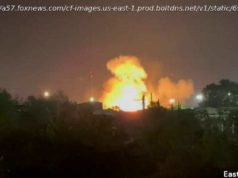First responders are suing over the exposure they say they suffered following a fire and detonation on the premises of the Arkema facility, which flooded during Hurricane Harvey.
First responders are suing over the exposure they say they suffered following a fire and detonation on the premises of the Arkema facility, which flooded during Hurricane Harvey.
“Toxicity is a relative thing.” So Arkema executive Richard Rennard described the noxious fumes emanating from a plant that had been flooded by Hurricane Harvey last week. Locals had claimed that the plant, which is dangerously close to residential areas, had caught fire—with some containers possibly exploding—and sent potentially poisonous chemicals across the area. Rennard and other Arkema officials vehemently denied those claims, claiming that the “pops” residents heard were not explosions, and that the chemical fumes leaking from the plant were “noxious, ” but not necessarily poisonous. A new lawsuit filed in a Harris County district court not only directly contradicts those claims from Arkema, but paints a much more harrowing picture of the facility’s meltdown following the flood. The suit alleges that a series of explosions on August 31 spread dangerous fumes to a perimeter 1.5 miles around the plant, where it incapacitated police officers charged with maintaining that perimeter, and then even overwhelmed medical professionals responding to their calls. The suit—filed by some of those first responders who say they were made ill by the fumes—also alleges that a series of negligent decisions by Arkema and operators at the plant led directly to those explosions, and to planned explosions on September 3 that it claims spread contaminated material into the surrounding neighborhoods.
The Crosby, Texas, facility, which French-owned Arkema operates, manufactured organic peroxides for the creation of plastics. Hurricane Harvey, which made landfall in Texas on August 25 and stalled over the gulf region of the state for the week after, dumped up to 40 inches of rain on the Crosby plant. Its main power source went out on August 27, and backup generators failed on August 28. Since organic peroxides need refrigeration to avoid ignition, Arkema feared explosions were imminent. On August 30, concerned about such explosions, the Harris County fire marshal evacuated people within that 1.5 mile perimeter, citing “a potential for a chemical reaction leading to a fire at the facility, which could produce a large amount of black smoke.” The lawsuit alleges that at least some of that buildup was avoidable. The plaintiffs cite the frequency of flooding in Houston—which has seen disastrous floods in each of the past three years—as a reason for Arkema officials to have been better prepared for the flood. According to the plaintiffs, Arkema “never heeded the warnings and ignored the foreseeable consequences of failing to prepare.” Those preparations might have included the adequate provision of backup refrigeration services in the case of loss of power, and the evacuation of critical personnel. On the day of the fires, the plaintiffs allege that first responders were required to secure the perimeter and wait for the “inevitable” explosions that would come. According to the suit, the fumes immediately sickened police officers, then sickened emergency medical personnel who were called to tend to them, and left several individuals hospitalized. Further, the suit claims that those responders had been put in the position to fall ill—and suffer potential unknown future health issues—because of the misrepresentations of Arkema executives, who have maintained that the substances leaking into the air and exploding were not toxic.
Just days after the last planned explosions at the Crosby facility, residents near the plant began moving back into their homes. But the lawsuit by the first responders has some implications for them as well. Residents have been wary of Arkema’s assurances that the plants fumes weren’ t anything more than unpleasant, and of claims that other forms of chemical contamination hadn’ t affected their homes. If during discovery—during which the plaintiffs have sought to obtain a restraining order on Arkema from tampering with evidence—and the course of the trial, the plaintiffs find that the chemicals first responders were exposed to were more dangerous than advertised, and that negligence on behalf of the company led to bodily harm, then residents of homes within and even outside the explosion may have similar concerns about exposure. The suit, in which plaintiffs are seeking damages over $1 million, is one of a few proceedings that will probe the nature and genesis of the Crosby plant explosion. In a statement on August 31, the U. S. Chemical Safety Board announced it would launch an investigation into the Arkema processes and protocols as soon as “the emergency response activities have been completed and the facility is deemed safe for entry.” Additionally, the Environmental Protection Agency, which apparently hasn’ t inspected the Arkema facility in 14 years, is working with the Texas Commission on Environmental Quality to monitor the site. On September 6, TCEQ announced “an open investigation into the Arkema incident that will include an evaluation of any impacts due to the fires at the site.”
Домой
United States
USA — Events The Exploding Chemical Plant Outside Houston Faces Its First Lawsuit






